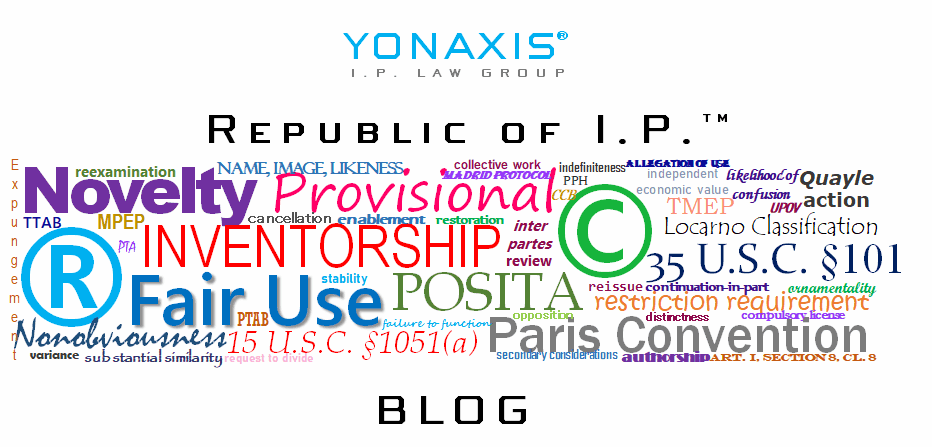Today, April 26, 2022, is World I.P. Day, where the World Intellectual Property Organization (WIPO), a specialized department of the United Nations, focuses attention on educating the public on all aspects of intellectual property rights and regimes. The theme this year is “IP and Youth.” This blog posting, however, will focus on COVID-19, and specifically …
Category: patent
U.S. Patent No. PP34,051 P3, for Cannabis Plant Named AV1-1
Today is an auspicious day for cannabis proponents, so we illustrate one recently issued patent to recognize this date. U.S. Patent No. PP34,051 P3 (‘051) issued on March 22, 2022, for “Cannabis Plant Named ‘AV1-1.’” It was issued to inventor Ytzchak Cohen of Tel Aviv, Israel. The applicant/assignee is Tikun Olam Ltd. of Tel Aviv, …
No April Fool’s: Russia Allowing I.P. Theft in Wake of Ukraine War
The Russia-Ukraine war has just entered its second month, and it appears Russia is using intellectual property piracy as a weapon in retaliation for crippling economic sanctions levied against it after Russian forces invaded Ukraine in February 2022. The decree was issued on March 7, 2022, just two weeks after the Russian invasion. The decree …
USPTO Cuts Ties with Rospatent, Belarus, EAPO
On March 7, 2022, the United States Patent and Trademark Office (USPTO) announced that it severed its ties with the Federal Service for Intellectual Property of Russia (i.e., Rospatent) and the Eurasian Patent Organization (EAPO) (which is based on Russia), as well as the National Center for Intellectual Property of Belarus. This is consistent with …
Ukrpatent Is, Amazingly, Still Operating
As news of the Russian invasion of Ukraine happened last week, the Ukraine State Intellectual Property Institute, or Ukrpatent, announced that it is, in fact, still operating on full-time “providing all the necessary functions and continuous operation of the state system of legal protection of intellectual property.” The Ukrpatent office is located in downtown Kyiv, …
In U.S., Only Humans Can Be Inventors or Creators
In the U.S., patents are issued to inventors and copyrights are registered to authors. Artificial intelligence (AI) has been gaining traction in automation of business processes, creating more efficient applications, and gathering of data analysis. However, as seen with the recent U.S. Copyright Office’s recent Copyright Review Board’s (CRB) decision demonstrates that under U.S. copyright …
Senator Requests Study on Uniting Federal IP Offices Into Single Office
U.S. Senator Thom Tillis (R-NC) has requested the Administrative Conference of the United States, the federal agency tasked with making federal functions more efficient, to conduct a study into the feasibility of having a unified, singular federal office devoted to intellectual property, combining the registration and prosecution functions currently handled by both the United States …
Comment Period on Patent Eligibility Extended
On September 2, 2021, the U.S. Patent and Trademark Office extended the deadline for submission of comments regarding the state of patent eligibility and its effectiveness on U.S. investments and innovation. The new date is October 15, 2021. The USPTO issued a notice on the Federal Register on July 9, 2021, requesting comments on patent …
U.S. Patent No. 10,888,283 B1
U.S. Patent No. 10,888,283 B1 (‘283), issued on January 12, 2021, to applicants/inventors Boonsieng Benjauthrit, Sorapod B. Benjauthrit, Vatcharee L. Benjauthrit, and Kamolchanok J. Benjauthrit, all of La Cañada, California. The claims are directed to an apparatus called a COVID-19 Symptoms Alert Machine (CSAM) scanning device comprising the scanner, temperature scanner, a patient-provided health information …
U.S. Patent No. 10,874,687 B1
U.S. Patent No. 10,874,687 B1 (‘687), issued on December 29, 2020, to inventors Jean-Pierre Sommadossi of Boston, Massachusetts, and Adel Moussa of Burlington, Massachusetts. The applicant/assignee is Atea Pharmaceuticals, Inc. of Boston, Massachusetts, an anti-viral drug developer. The claims are directed to a method of therapeutic use for treating COVID-19, comprising the purine nucleotide phosphoramidate …
